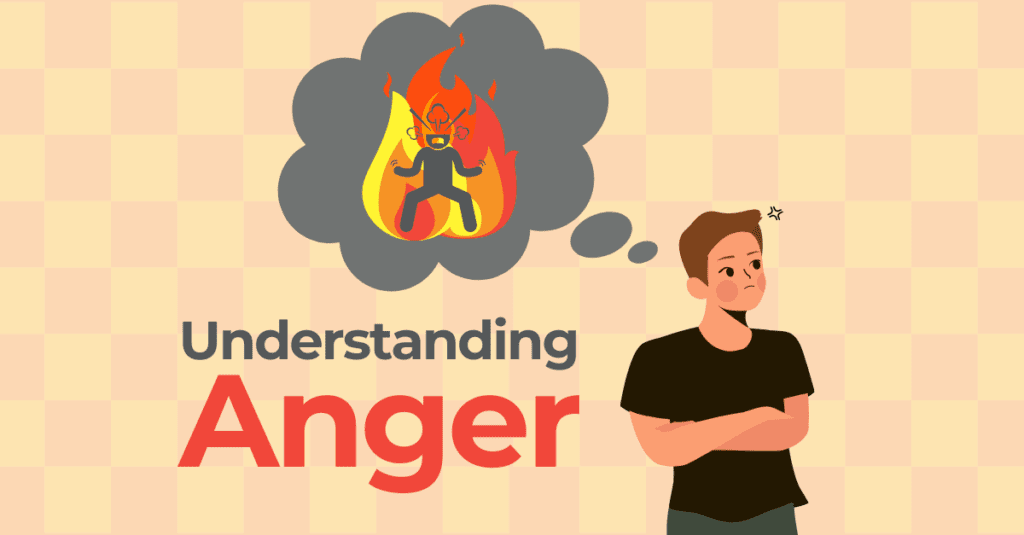
Is anger good or bad?
By Dr Crosby S
The concept of whether anger is inherently “good” or “bad” is subjective and depends on how it is experienced, expressed, and managed. Anger itself is a natural and normal emotion that everyone experiences from time to time. It serves as a signal that something is wrong or needs attention.

In some situations, anger can be constructive and even beneficial. For example:

Motivation: Anger can motivate individuals to take action and address injustices or challenges they face. It can drive them to advocate for change and stand up for themselves or others.
Setting Boundaries: Anger can help individuals assert their boundaries and communicate their needs more effectively. It can signal to others when their actions are unacceptable or when personal space is being violated.
Problem-Solving: In certain cases, anger can facilitate problem-solving by energizing individuals to confront and resolve conflicts or issues in relationships or situations.
This statement highlights a nuanced perspective on anger, acknowledging that while it can have negative consequences when mismanaged, it can also serve as a motivational force when channeled effectively. Understanding the connections between thoughts, feelings, and behaviors is indeed crucial for adolescents in managing their emotions, including anger, in a healthy and constructive manner.
It’s essential to provide teenagers with the tools and support they need to recognize and regulate their emotions, including anger, as part of their overall emotional intelligence development. Teaching them coping mechanisms, problem-solving skills, and communication strategies can empower them to navigate challenging situations and foster positive relationships.
Additionally, addressing any underlying issues contributing to anger, such as stress, trauma, or unresolved conflicts, is important for promoting long-term emotional well-being. By fostering self-awareness and providing a supportive environment, teenagers can learn to harness the energy of their emotions, including anger, in ways that contribute to their growth and resilience.
Explaining anger management to teenagers is important for their overall well-being and development. Here are some key points to consider when discussing this topic with them:

Understanding Anger: Begin by helping teens understand what anger is and how it manifests. Explain that anger is a natural emotion that everyone experiences, but it’s important to recognize when it becomes overwhelming or uncontrollable.
Identifying Triggers: Encourage teens to identify their triggers for anger. These triggers could be specific situations, events, or even internal thoughts or feelings. By recognizing what sets off their anger, teens can become more aware of their emotions and take steps to manage them.

Healthy Expression: Teach teens healthy ways to express their anger. This could include techniques such as deep breathing, taking a break, or engaging in physical activity. Encourage them to find outlets for their emotions that are productive and constructive.
Communication Skills: Help teens develop effective communication skills to express their feelings assertively and respectfully. Teach them how to use “I” statements and active listening techniques to communicate their needs and concerns without escalating conflicts.
Problem-Solving Strategies: Teach teens problem-solving strategies to address the underlying issues that may be causing their anger. Encourage them to brainstorm solutions, consider the consequences of their actions, and seek help from trusted adults or professionals if needed.
Managing Stress: Emphasize the importance of managing stress as a way to prevent anger from escalating. Encourage teens to practice self-care activities such as exercise, relaxation techniques, and maintaining a healthy lifestyle.
Seeking Help: Let teens know that it’s okay to seek help if they’re struggling to manage their anger. Offer resources such as counseling, therapy, or support groups where they can learn additional coping skills and receive professional guidance.
By addressing anger management with teenagers in a supportive and proactive manner, you can help them develop the necessary skills to navigate their emotions effectively and lead healthier, happier lives.

Understanding and addressing teenage rage
It requires a multi-faceted approach that takes into account the unique challenges and characteristics of adolescence. Here are some key considerations for parents, teachers, therapists, or caregivers when dealing with teenage anger:
Understanding Triggers: Adolescents may experience anger in response to a variety of triggers, including academic pressure, social conflicts, family issues, hormonal changes, or underlying mental health concerns. It’s important to identify the specific triggers for each individual and address them appropriately.
Assessing Control: Determine whether the teenager has control over their anger or if it is impulsive and uncontrollable. This assessment can help tailor interventions and support strategies accordingly.
Teaching Coping Skills: Provide teenagers with effective coping skills to manage their anger in healthier ways. This may include teaching relaxation techniques, problem-solving skills, assertive communication, mindfulness practices, and emotional regulation strategies.
Addressing Underlying Issues: Explore potential underlying issues contributing to the anger, such as unresolved trauma, substance abuse, mental health disorders, or neurological factors. Addressing these underlying issues may help reduce the frequency and intensity of angry outbursts.
Supporting Healthy Brain Development: Recognize that the teenage brain is still developing, particularly in areas related to impulse control, emotion regulation, and decision-making. Encourage activities and behaviors that support healthy brain development, such as adequate sleep, regular exercise, balanced nutrition, and minimizing exposure to substances that can affect brain chemistry.
Seeking Professional Help: If teenage rage persists or escalates to extreme behaviors such as substance abuse, violence, or self-harm, it’s important to seek professional help from a therapist, counselor, or psychiatrist who specializes in adolescent mental health. They can provide comprehensive assessment, therapy, and support tailored to the teenager’s needs.
Absolutely, understanding the specific triggers and patterns of behavior associated with teenage anger can be crucial in effectively addressing and managing it. Identifying these triggers allows parents, teachers, therapists, and caregivers to implement proactive strategies to prevent or mitigate angry outbursts. Here’s how each of these triggers can be addressed:
Following School: Teenagers may experience anger after school due to a variety of reasons such as academic stress, social interactions, or frustration from the day’s events. Providing a supportive environment where they feel comfortable discussing their day and any challenges they faced can help alleviate pent-up frustration.
When Fatigued or Hungry: Hunger and fatigue can exacerbate irritability and anger in teenagers. Encouraging healthy eating habits, regular meals, and adequate sleep can help regulate mood and prevent anger triggered by physical discomfort.
After Alterations to Routines: Teenagers thrive on routine, and disruptions to their schedules can cause stress and frustration. Communicating changes in advance and helping them adapt to new routines gradually can minimize anger triggered by unexpected changes.
Following the Viewing of Specific TV Series, Films, or Online Content: Certain media content may provoke strong emotional reactions in teenagers, including anger. Monitoring their media consumption and discussing the content they engage with can help identify triggers and address any negative influences.

Recognize and address the behaviors linked to anger:
The behaviors can have significant consequences for their well-being and development. Key points to consider when dealing with teenagers exhibiting anger-related behaviors:
Acting Impolitely and Inconsiderately Towards Adults: Teenagers may express their anger by being disrespectful or rude towards authority figures such as parents, teachers, or other adults. This behavior can stem from feelings of frustration, rebellion, or a desire for independence.
Getting Into Fights and Altercations: Engaging in physical altercations or conflicts with peers is a concerning behavior associated with anger in teenagers. This behavior can result from feelings of anger, aggression, or a lack of effective conflict resolution skills.
Outbursts and Speaking in a Spiteful Manner: Teenagers may exhibit outbursts of anger characterized by yelling, screaming, or speaking in a hurtful or spiteful manner. These outbursts can be triggered by various stressors, frustrations, or unresolved emotions.
Actions Driven by Retaliation and Fury: Some teenagers may engage in retaliatory behavior as a response to perceived injustices or slights. This can manifest as acts of aggression, vandalism, or other destructive behaviors driven by feelings of anger and resentment.
Substance Abuse: Teenagers may turn to substance abuse as a way to cope with or numb their feelings of anger and frustration. Substance abuse can exacerbate existing emotional problems and lead to additional negative consequences.
Academic Decline: Anger and related emotional issues can impact a teenager’s academic performance, leading to declining grades and falling behind their peers academically. This decline may be a result of difficulties concentrating, managing emotions, or engaging in school-related activities.
Sign of Underlying Emotional Problems: Excessive anger in teenagers can also be a sign of more significant emotional problems such as depression, anxiety, trauma, or unresolved issues.
Addressing anger-related behaviors in teenagers requires a comprehensive approach that involves understanding the underlying causes, teaching coping skills, providing support, and seeking professional intervention when necessary. By addressing these behaviors proactively, adults can help teenagers navigate their emotions more effectively and promote their overall well-being.

Controlling adolescent rage:
Involves a combination of emotional regulation techniques, social support, and maintaining overall well-being. Here are some strategies that can help teenagers manage and reduce their levels of rage:
Forming Deep and Healthy Relationships: Building strong and supportive relationships with parents, guardians, or other trusted adults can provide teenagers with a safe space to express their emotions and seek guidance. Having someone they can confide in and turn to for support can help alleviate feelings of anger and frustration.
Acquiring Sophisticated Social Skills: Developing social skills such as effective communication, conflict resolution, empathy, and perspective-taking can help teenagers navigate interpersonal relationships more successfully. By understanding their own emotions and the emotions of others, teenagers can better manage conflicts and avoid escalating situations that may trigger rage.

Prioritizing Sleep: Adequate sleep is essential for emotional regulation and overall mental health, especially during adolescence when the body and brain are undergoing significant changes. Teenagers should aim for approximately 8.5 hours of sleep each night to support their emotional well-being and cognitive functioning.
Engaging in Stress-Reducing Activities: Encouraging teenagers to participate in activities that promote relaxation and stress reduction can help alleviate feelings of anger and tension. This may include hobbies, physical exercise, mindfulness practices, or spending time in nature.
Seeking Professional Support: If a teenager’s rage is persistent or significantly impacting their daily life, seeking professional support from a therapist, counselor, or mental health professional may be beneficial. Therapy can provide teenagers with coping skills, emotional regulation techniques, and a safe space to explore and address underlying issues contributing to their anger.
By implementing these strategies and providing teenagers with the support they need, adults can help adolescents learn to manage and control their rage in healthy and constructive ways, leading to improved emotional well-being and relationships